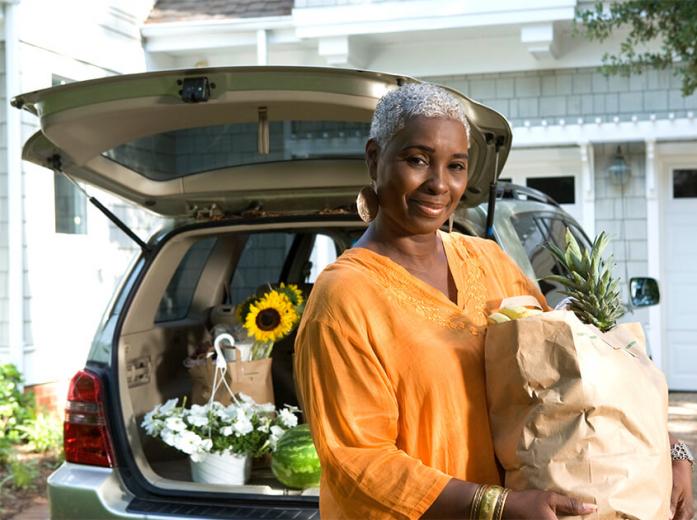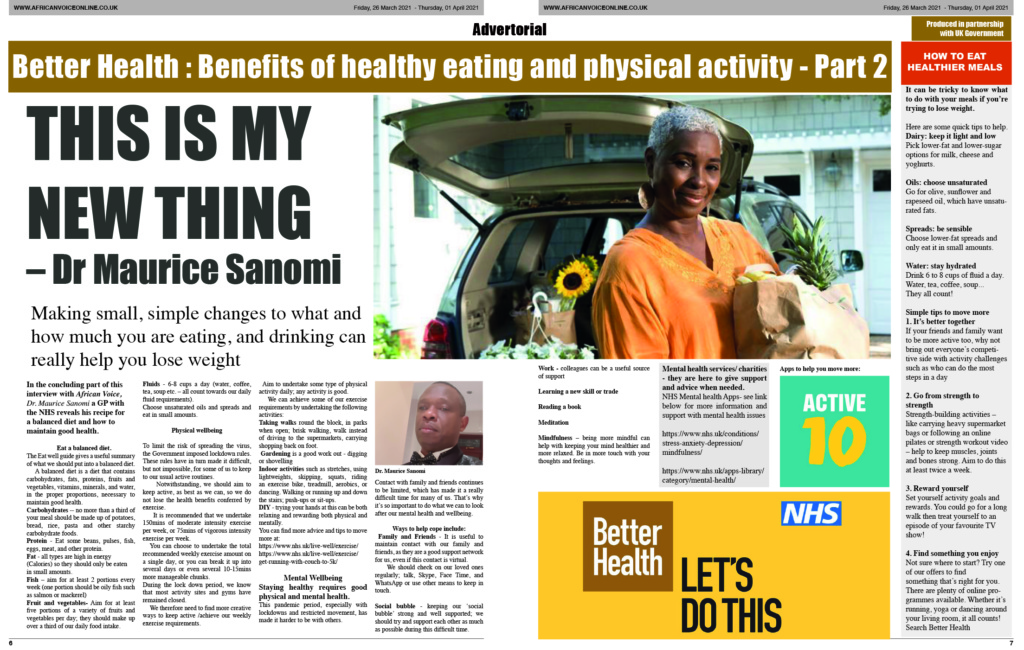Better Health : Benefits of healthy eating and physical activity – Part 2

Making small, simple changes to what and how much you are eating, and drinking can really help you lose weight
In the concluding part of this interview with African Voice, Dr. Maurice Sanomi a GP with the NHS reveals his recipe for a balanced diet and how to maintain good health.

Eat a balanced diet.
The Eat well guide gives a useful summary of what we should put into a balanced diet. A balanced diet is a diet that contains carbohydrates, fats, proteins, fruits and vegetables, vitamins, minerals, and water, in the proper proportions, necessary to maintain good health.
Carbohydrates — no more than a third of your meal should be made up of potatoes, bread, rice, pasta and other starchy carbohydrate foods.
Protein – Eat some beans, pulses, fish, eggs, meat, and other protein.
Fat – all types are high in energy
(Calories) so they should only be eaten in small amounts.
Fish – aim for at least 2 portions every week (one portion should be oily fish such as salmon or mackerel)
Fruit and vegetables- Aim for at least five portions of a variety of fruits and vegetables per day; they should make up over a third of our daily food intake.
Fluids – 6-8 cups a day (water, coffee, tea, soup etc. – all count towards our daily fluid requirements).
Choose unsaturated oils and spreads and eat in small amounts.
Physical wellbeing
To limit the risk of spreading the virus, the Government imposed lockdown rules. These rules have in turn made it difficult, but not impossible, for some of us to keep to our usual active routines.
Notwithstanding, we should aim to keep active, as best as we can, so we do not lose the health benefits conferred by exercise. It is recommended that we undertake 150mins of moderate intensity exercise per week, or 75mins of vigorous intensity exercise per week.
You can choose to undertake the total recommended weekly exercise amount on a single day, or you can break it up into several days or even several 10-15mins more manageable chunks.
During the lock down period, we know that most activity sites and gyms have remained closed.
We therefore need to find more creative ways to keep active /achieve our weekly exercise requirements.
Aim to undertake some type of physical activity daily; any activity is good.
We can achieve some of our exercise requirements by undertaking the following activities:
Taking walks round the block, in parks when open; brisk walking, walk instead of driving to the supermarkets, carrying shopping back on foot.
Gardening is a good work out – digging or shovelling
Indoor activities such as stretches, using lightweights, skipping, squats, riding an exercise bike, treadmill, aerobics, or dancing. Walking or running up and down the stairs; push-ups or sit-ups.
DIY – trying your hands at this can be both relaxing and rewarding both physical and mentally.
You can find more advice and tips to move more at:
Mental Wellbeing
Staying healthy requires good physical and mental health.
This pandemic period, especially with lockdowns and restricted movement, has made it harder to be with others.
Contact with family and friends continues to be limited, which has made it a really difficult time for many of us. That’s why it’s so important to do what we can to look after our mental health and wellbeing.
Ways to help cope include:
Family and Friends – It is useful to maintain contact with our family and friends, as they are a good support network for us, even if this contact is virtual.
We should check on our loved ones regularly; talk, Skype, Face Time, and WhatsApp or use other means to keep in touch.
Social bubble – keeping our ‘social bubble’ strong and well supported; we should try and support each other as much as possible during this difficult time.
Work – colleagues can be a useful source of support
Learning a new skill or trade
Reading a book
Meditation
Mindfulness – being more mindful can help with keeping your mind healthier and more relaxed. Be in more touch with your thoughts and feelings.
Mental health services/ charities – they are here to give support and advice when needed.
NHS Mental health Apps- see link below for more information and support with mental health issues
Apps to help you move more:

HOW TO EAT HEALTHIER MEALS
It can be tricky to know what to do with your meals if you’re trying to lose weight.
Here are some quick tips to help.
Dairy: keep it light and low
Pick lower-fat and lower-sugar options for milk, cheese and yoghurts.
Oils: choose unsaturated
Go for olive, sunflower and rapeseed oil, which have unsaturated fats.
Spreads: be sensible
Choose lower-fat spreads and only eat it in small amounts.
Water: stay hydrated
Drink 6 to 8 cups of fluid a day. Water, tea, coffee, soup…
They all count!
Simple tips to move more
1. It’s better together
If your friends and family want to be more active too, why not bring out everyone’s competitive side with activity challenges such as who can do the most steps in a day
2. Go from strength to strength
Strength-building activities – like carrying heavy supermarket bags or following an online pilates or strength workout video – help to keep muscles, joints and bones strong. Aim to do this at least twice a week.
3. Reward yourself
Set yourself activity goals and rewards. You could go for a long walk then treat yourself to an episode of your favourite TV show!
4. Find something you enjoy
Not sure where to start? Try one of our offers to find something that’s right for you. There are plenty of online programmes available. Whether it’s running, yoga or dancing around your living room, it all counts! Search Better Health.
Kindly follow us on twitter:@AfricanVoice2













